山东省济南第一中学2015-2016学年高一英语下学期期中试题
- 格式:doc
- 大小:254.50 KB
- 文档页数:12
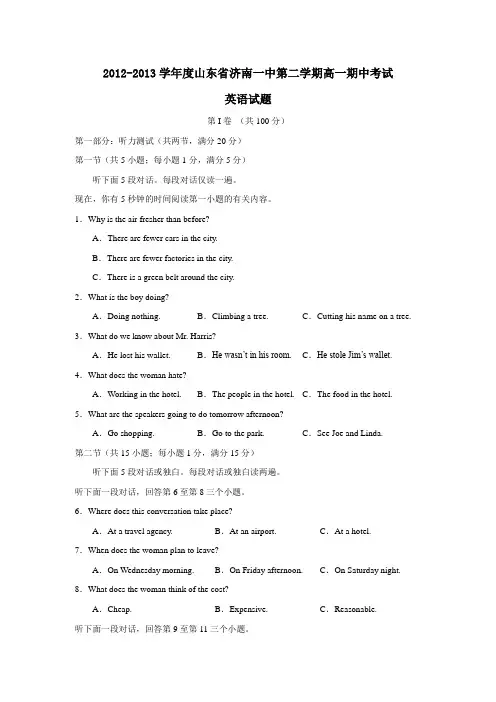
2012-2013学年度山东省济南一中第二学期高一期中考试英语试题第I卷(共100分)第一部分:听力测试(共两节,满分20分)第一节(共5小题;每小题1分,满分5分)听下面5段对话。
每段对话仅读一遍。
现在,你有5秒钟的时间阅读第一小题的有关内容。
1.Why is the air fresher than before?A.There are fewer cars in the city.B.There are fewer factories in the city.C.There is a green belt around the city.2.What is the boy doing?A.Doing nothing. B.Climbing a tree. C.Cutting his name on a tree. 3.What do we know about Mr. Harris?A.He lost his wallet. B.He wasn’t in his room. C.He stole Jim’s wallet. 4.What does the woman hate?A.Working in the hotel. B.The people in the hotel. C.The food in the hotel. 5.What are the speakers going to do tomorrow afternoon?A.Go shopping. B.Go to the park. C.See Joe and Linda.第二节(共15小题;每小题1分,满分15分)听下面5段对话或独白。
每段对话或独白读两遍。
听下面一段对话,回答第6至第8三个小题。
6.Where does this conversation take place?A.At a travel agency. B.At an airport. C.At a hotel. 7.When does the woman plan to leave?A.On Wednesday morning. B.On Friday afternoon. C.On Saturday night. 8.What does the woman think of the cost?A.Cheap. B.Expensive. C.Reasonable.听下面一段对话,回答第9至第11三个小题。

2015-2016学年度第二学期第二次阶段考试高一英语试题本试卷分第I 卷(选择题)和第II 卷(非选择题)两部分。
第I 卷(共110分)第一部分:听力(共两节,满分20分)第一节(共5小题;每小题1分,满分5分)听下面5段对话。
每段对话后有一个小题,从题中所给的A、B、C三个选项中选出最佳选项,并标在试卷的相应位置。
听完每段对话后,你都有10秒钟的时间来回来有关小题和阅读下一小题。
每段对话仅读一遍。
1. How is the weather in the woman’s opinion?A. Warm.B. Cold.C. Hot.2. What does the man mean?A. He already has plans.B. The woman should decide.C. He will make a reservation.3. Why did the man go to Beijing?A. To visit his parents.B. To have an interview.C. To receive job training.4. What are the two speakers talking about?A. What to take up as a hobby.B. How to keep fit.C. How to handle pressure.5. What will the man do first?A. Tidy his room.B. Go on a picnic.C. Wear clothes.第二节(共15小题;每小题1分,满分15分)听下面5段对话。
每段对话后有几个小题,从题中所给的A、B、C三个选项中选出最佳选项,并标在试卷的相应位置。
听每段对话前,你将有时间阅读各个小题,每小题5秒钟;听完后,各小题将给出5秒钟的作答时间。
每段对话读两遍。
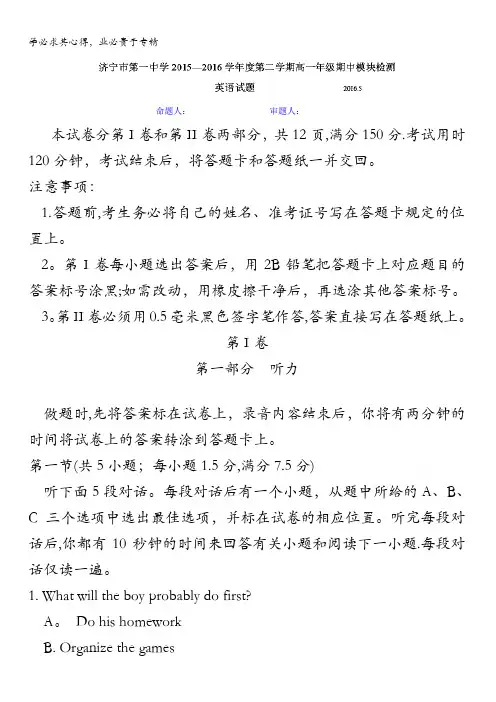
命题人:审题人:本试卷分第I卷和第II卷两部分,共12页,满分150分.考试用时120分钟,考试结束后,将答题卡和答题纸一并交回。
注意事项:1.答题前,考生务必将自己的姓名、准考证号写在答题卡规定的位置上。
2。
第I卷每小题选出答案后,用2B铅笔把答题卡上对应题目的答案标号涂黑;如需改动,用橡皮擦干净后,再选涂其他答案标号。
3。
第II卷必须用0.5毫米黑色签字笔作答,答案直接写在答题纸上。
第I卷第一部分听力做题时,先将答案标在试卷上,录音内容结束后,你将有两分钟的时间将试卷上的答案转涂到答题卡上。
第一节(共5小题;每小题1.5分,满分7.5分)听下面5段对话。
每段对话后有一个小题,从题中所给的A、B、C三个选项中选出最佳选项,并标在试卷的相应位置。
听完每段对话后,你都有10秒钟的时间来回答有关小题和阅读下一小题.每段对话仅读一遍。
1. What will the boy probably do first?A。
Do his homeworkB. Organize the gamesC。
Do the housework2. Where is the man going?A。
Mott StreetB. Elm StreetC。
Black street3. How many dogs do they have?A。
7 B。
4 C。
34. Who is the woman probably?A. John’s secretaryB. Mr。
Graham’s secretaryC. The man’s boss5. What can we learn from the conversation?A。
The fire broke out yesterdayB。
The fire didn’t spreadC. No one died in the fire第二节(共15小题;每小题1.5分,满分22.5分)听下面5段对话或独白。

2015~2016学年度第二学期模块测试高一英语第Ⅰ卷客观卷(共70分)第一部分阅读理解(共两节,满分40分)第一节:(共15小题;每小题2分,满分30分)AChristmas Eve was tomorrow. I hoped one of the packages that held a camera had already been placed under the Christmas tree. It was the only thing I wanted. I had been dropping hints to my parents. I love taking photos. My bedroom walls are covered with photos I had taken with my mom’s old camera. I’m always trying to capture (捕捉) those perfect moments in which you can hear the laughter or touch the beautiful scene, but my camera has always seemed to fall short.I knew Mom had put a few presents under the tree this morning, so I went on a hunt in my mom’s room. I opened the door and found my Christmas present was lying unwrapped on the floor — a big pink cat. I felt so disappointed.Mom seemed to notice that, and she tried to cheer me up. ―Stacy, I got your present today. I am so excited to surprise you!‖ ―I can’t wait,‖ I said.The next day I couldn’t wait any longer. I needed to tell her.―Mom, may I talk to you for a second?‖―Sure, dear. What do you need to talk about?‖ she asked.And so it came — how upset I was that I was getting a cat.―Stacy, that cat is for your sister Julia!‖ she said with a smile.―Then what am I getting?‖ I asked.She just smiled. ―You’ll have to wait and see.‖The next morning, I happily got into the living room and sat next to the tree. I pulled out the box with my name on it and opened the wrapping paper to find ...My camera! ―Thank you!‖ I said to both Dad and Mom.Dad picked up the camera and took a picture of Julia, Mom and me. It has become one of my favorite pictures. Just on that Christmas morning, I took lots of photos with my camera —my little sister making a face, my parents giving me a soft smile — and all of these photos have come to mean one thing to me: love.1. The underlined phrase ―dropping hints‖ in Paragraph 1 means _____.A. talking oftenB. suggesting indirectlyC. sending presentsD. taking pictures2. Why did Stacy feel disappointed at first?A. Her mother couldn’t understand her at all.B. Her mother didn’t buy her any Christmas gift.C. She didn’t find her present in her mom’s room.D. She mistook her sister’s Christmas gi ft for hers.3. We can infer from the passage that _____.A. her mother bought Stacy a camera after discovering her disappointmentB. Stacy finally got her gift on Christmas EveC. Stacy thought it’s OK to have an old cameraD. her mother knew what gift Stacy wanted for Christmas4. What would be the best title for the passage?A. A Christmas gift as wished.B. Love is more important than gifts.C. A wonderful Christmas.D. Love can not be bought.BWhat are you feeling right now as you start to read this? Are you curious? Hoping that you’ll learn something about yourself? Bored because this is something you have to do for school and you’re not really into it —or happy because it’s a school project you enjoy? Perhaps you’re attracted by something else, like feeling excited about your weekend plans or sad because you just went through a breakup.Emotions like these are part of human nature. They give us information about what we’re experiencing and help us know how to react. We sense our emotions from the time we’re babies. Young children react to their emotions with facial expressions or with actions like laughing orcrying. They feel and show emotions, but they don’t yet have the ability to name the emotion or say why they feel that way.As we grow up, we become more skilled in understanding emotions. Instead of just reacting like little kids do, we can identify(定义)what we feel and put it into words. With time and practice, we get better at knowing what we are feeling and why. This skill is called emotional awareness.Emotional awareness helps us know what we need and want, or don’t want! It helps us build better relationships. That’s because being aware of our emotions can help us talk about feelings more clearly, avoid or settle conflicts(冲突)better, and move past difficult feelings more easily.Some people are naturally more in touch with their emotions than others. The good news is that everyone can be more aware of their emotions. It just takes pract ice. But it’s worth the effort.Emotional awareness is the first step toward building emotional intelligence, a skill that can help people succeed in life.5. How do young children react to emotions?A. With laughter and shouts.B. With signs and expressions.C. With facial expressions and actions.D. With gestures of different kinds.6. From the passage we know that emotional awareness actually _________.A. enables us to live in society more easilyB. lets people understand others betterC. brings about conflicts between peopleD. smooths away difficulties in our life7. Where is the passage probably taken from?A. A science fiction.B. An advertisement.C. A science magazine.D. A television show.CEnglish is fast becoming the language of science around the world, but what is its future among everyday speakers? One expert points out that the percentage(比率) of native English speakers is declining(降低) while the languages of other rapidly growing regions are being spoken by increasing numbers of people. But English will continue to remain widespread and important.However, British language scholar David Graddol says English will probably drop in dominance(主导) by the middle of this century to rank after Chinese, about equally with Arabic, Hindi, and Urdu. ―The number of people speaking English as a first language continues to rise, but it isn’t rising nearly as fast as the numbers of many other languages around the world, simply because the main population group has been largely in the less developed countries where languages other than English have been spoken,‖ he says.In a recent article in the journal Science, Mr. Graddol noted that three languages that are not near the top of the list of the most widely spoken now might be there soon. These are Bengali, Tamil, and Malay, spoken in south and southeast Asia.David Crystal, the author of the Cambridge Encyclopedia of the English Language, says about 1.5 billion of the world’s six billion people speak it as a second language compared to the 400 million native speakers. But another expert on the English language says Mr. Graddol underestimates (低估) the future of its dominance. ―All the evidence suggests that the English language snowball is rolling down a hill and is getting faster, but nobody quite knows what’s going to happen because no language has been in this position before.‖ he said.8.In David Graddol’ s opinion, English will _______.A.remain widespread and importantB.be more important than any other languageC.lose its dominant positionD.die away in the near future9.The underlined sentence in the last paragraph implies that ______.A.more and more language users will choose EnglishB.the English language snowball is rolling down faster than any time in the pastC.English language will soon drop in dominanceD.snowballs will roll down faster than language balls10.How many experts does the passage mention who express their ideas about the future of English?A.2. B.3. C.4. D.5.11.What should be the best title for the passage?A.English Remaining in the Dominant PositionB.The Future of English? Who Knows?C.Opinions from Different ExpertsD.The English Language Snowball Rolling DownDInternational students are allowed to work for the university they study at or for a business at the school. But the business must directly provide a service for students. You could work at the bookstore, for example, but not for a company that is building something at the school. Also, a foreign student cannot take the place of an American in a job.International students can work 20 hours a week while having classes; more during school breaks. You can work until you finish your studies.International students normally cannot take a job that has nothing to do with their school. But the government may give permission if students are suddenly faced with difficulties. Examples include large medical bills, the shortage of financial (财政上的) aid or an unexpected change in the financial support.Students must also meet other conditions (条件). They must have studied at their American school for at least one year. Students must ask for permission again after a year if they want to continue an off-campus (校外的) job.International students who will be studying at graduate school can apply (申请) for some jobs before they come to the United States. A good example is a university job like a teaching or research assistant.Some schools pay their assistants. Others provide free education in return. Many do both. Graduate assistants might teach, give tests, grade work, help with research and clean the offices. Many universities now provide language training for foreign teaching assistants to help them improve their English. Some schools ask foreign students to pass an English speaking test before they are allowed to teach.International student offices at schools have to provide information on students each term for the Department of Homeland Security. Students who violate visa (签证) rules —for example, by working off-campus without permission —could be sent home.12. What can we learn according to the passage?A. All the international students can work for large companies.B. International students are able to work whenever they like.C. International students may be allowed to work outside the school when having financial trouble.D. International students must have studied at their American school for less than a year to get ajob.13. We may infer from the passage that ____.A. international students could apply for some jobs before coming to the USB. all the schools pay their assistants and provide free education for themC. international students cannot take their jobs before having language trainingD. international students normally are not completely free to choose their jobs14. The under lined word ―violate‖ in the last paragraph probably means ____.A. ask forB. go againstC. forgetD. obey15. What is the passage mainly about?A. The rules about getting a job while studying in the US for international students.B. The reason why international students like studying in the United States.C. What international students should do while working in the United States.D. How international students could find jobs while studying in the US.第二节:(共5小题;每小题2分,满分10分)根据短文内容,从短文后的选项中选出能填入空白处的最佳选项。
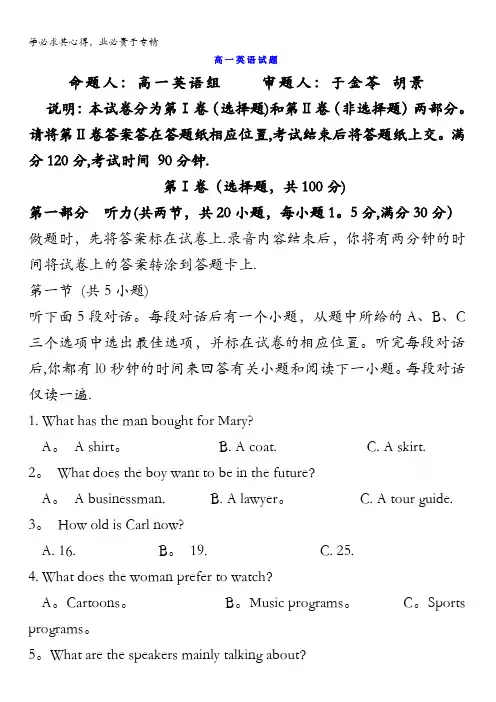
高一英语试题命题人:高一英语组审题人:于金苓胡景说明:本试卷分为第Ⅰ卷(选择题)和第Ⅱ卷(非选择题)两部分。
请将第Ⅱ卷答案答在答题纸相应位置,考试结束后将答题纸上交。
满分120分,考试时间90分钟.第Ⅰ卷(选择题,共100分)第一部分听力(共两节,共20小题,每小题1。
5分,满分30分)做题时,先将答案标在试卷上.录音内容结束后,你将有两分钟的时间将试卷上的答案转涂到答题卡上.第一节(共5小题)听下面5段对话。
每段对话后有一个小题,从题中所给的A、B、C 三个选项中选出最佳选项,并标在试卷的相应位置。
听完每段对话后,你都有l0秒钟的时间来回答有关小题和阅读下一小题。
每段对话仅读一遍.1. What has the man bought for Mary?A。
A shirt。
B. A coat. C. A skirt.2。
What does the boy want to be in the future?A。
A businessman. B. A lawyer。
C. A tour guide. 3。
How old is Carl now?A. 16. B。
19. C. 25.4. What does the woman prefer to watch?A。
Cartoons。
B。
Music programs。
C。
Sports programs。
5。
What are the speakers mainly talking about?A. A concert。
B。
A country. C. A band。
第二节(共15小题)听下面5段对话或独自。
每段对话或独自后有几个小题,从题中所给的A、B、C三个选项中选出最佳选项,并标在试卷的相应位置。
听每段对话或独白前,你将有时间阅读各个小题,每小题5秒钟;听完后,各小题给出5秒钟的作答时间。
每段对话或独自读两遍。
听第6段材料,回答第6、7题。
6. What is the weather like?A。
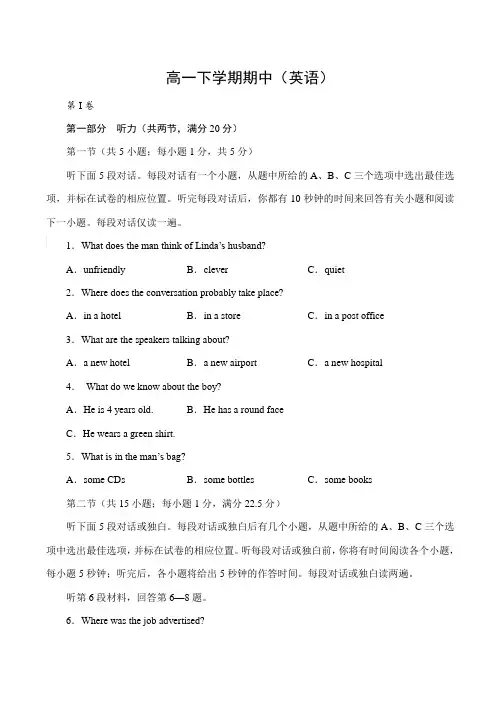
高一下学期期中(英语)第I卷第一部分听力(共两节,满分20分)第一节(共5小题;每小题1分,共5分)听下面5段对话。
每段对话有一个小题,从题中所给的A、B、C三个选项中选出最佳选项,并标在试卷的相应位置。
听完每段对话后,你都有10秒钟的时间来回答有关小题和阅读下一小题。
每段对话仅读一遍。
1.What does the man think of Linda’s husband?A.unfriendly B.clever C.quiet2.Where does the conversation probably take place?A.in a hotel B.in a store C.in a post office3.What are the speakers talking about?A.a new hotel B.a new airport C.a new hospital4.What do we know about the boy?A.He is 4 years old. B.He has a round faceC.He wears a green shirt.5.What is in the man’s bag?A.some CDs B.some bottles C.some books第二节(共15小题;每小题1分,满分22.5分)听下面5段对话或独白。
每段对话或独白后有几个小题,从题中所给的A、B、C三个选项中选出最佳选项,并标在试卷的相应位置。
听每段对话或独白前,你将有时间阅读各个小题,每小题5秒钟;听完后,各小题将给出5秒钟的作答时间。
每段对话或独白读两遍。
听第6段材料,回答第6—8题。
6.Where was the job advertised?A.on TV B.in the magazine C.in the newspaper 7.Which job is the woman interested in?A.interpreter B.secretary C.teacher 8.When will the woman come for the interview?A.next Monday morningB.next Monday afternoonC.next Tuesday morning.听第7段材料,回答第9—11题。
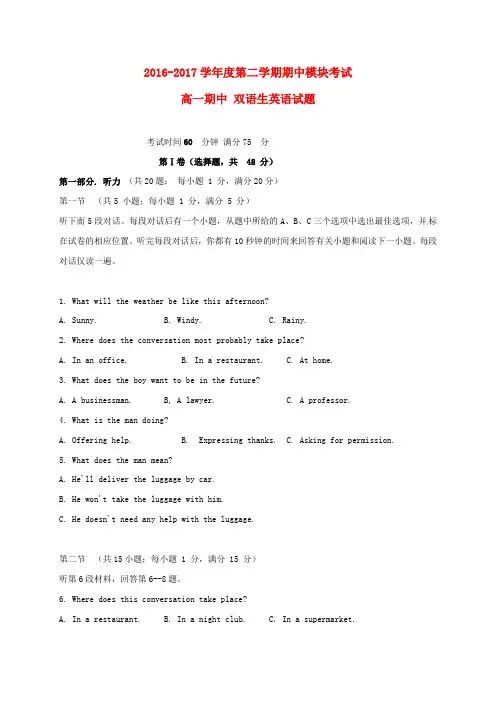
2016-2017学年度第二学期期中模块考试高一期中双语生英语试题考试时间60分钟满分75分第Ⅰ卷(选择题,共 48 分)第一部分. 听力(共20题;每小题 1 分,满分20分)第一节(共5 小题;每小题 1 分,满分 5 分)听下面5段对话。
每段对话后有一个小题,从题中所给的A、B、C三个选项中选出最佳选项,并标在试卷的相应位置。
听完每段对话后,你都有10秒钟的时间来回答有关小题和阅读下一小题。
每段对话仅读一遍。
1. What will the weather be like this afternoon?A. Sunny.B. Windy.C. Rainy.2. Where does the conversation most probably take place?A. In an office.B. In a restaurant.C. At home.3. What does the boy want to be in the future?A. A businessman. B, A lawyer. C. A professor.4. What is the man doing?A. Offering help.B. Expressing thanks.C. Asking for permission.5. What does the man mean?A. He'll deliver the luggage by car.B. He won't take the luggage with him.C. He doesn't need any help with the luggage.第二节(共15小题;每小题 1 分,满分 15 分)听第6段材料,回答第6--8题。
6. Where does this conversation take place?A. In a restaurant.B. In a night club.C. In a supermarket.7. What kind of snack will the man have?A. Pancake.B. Chips.C. Salad.8. How much does the man pay for the things he asked?A. 75 pence.B. 1.30 pounds.C. 2.05 pounds.听第7段材料,回答第9--11题。
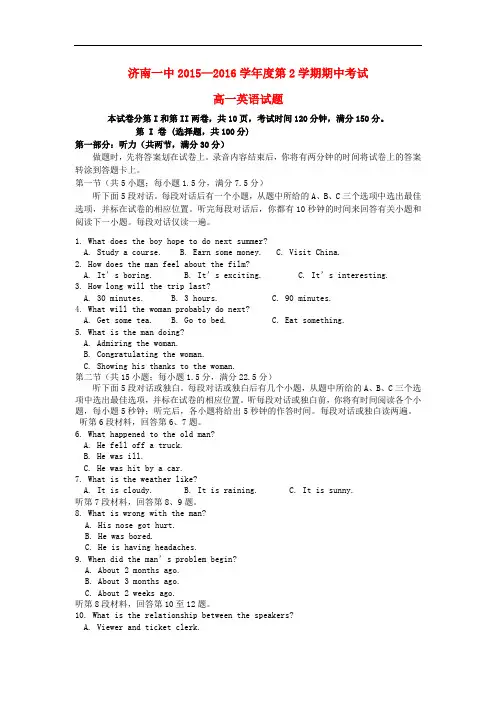
济南一中2015—2016学年度第2学期期中考试高一英语试题本试卷分第I和第II两卷,共10页,考试时间120分钟,满分150分。
第 I 卷 (选择题,共100分)第一部分:听力(共两节,满分30分)做题时,先将答案划在试卷上。
录音内容结束后,你将有两分钟的时间将试卷上的答案转涂到答题卡上。
第一节(共5小题;每小题1.5分,满分7.5分)听下面5段对话。
每段对话后有一个小题,从题中所给的A、B、C三个选项中选出最佳选项,并标在试卷的相应位置。
听完每段对话后,你都有10秒钟的时间来回答有关小题和阅读下一小题。
每段对话仅读一遍。
1. What does the boy hope to do next summer?A. Study a course.B. Earn some money.C. Visit China.2. How does the man feel about the film?A. It’s boring.B. It’s exciting.C. It’s interesting.3. How long will the trip last?A. 30 minutes.B. 3 hours.C. 90 minutes.4. What will the woman probably do next?A. Get some tea.B. Go to bed.C. Eat something.5. What is the man doing?A. Admiring the woman.B. Congratulating the woman.C. Showing his thanks to the woman.第二节(共15小题;每小题1.5分,满分22.5分)听下面5段对话或独白。
每段对话或独白后有几个小题,从题中所给的A、B、C三个选项中选出最佳选项,并标在试卷的相应位置。
听每段对话或独白前,你将有时间阅读各个小题,每小题5秒钟;听完后,各小题将给出5秒钟的作答时间。
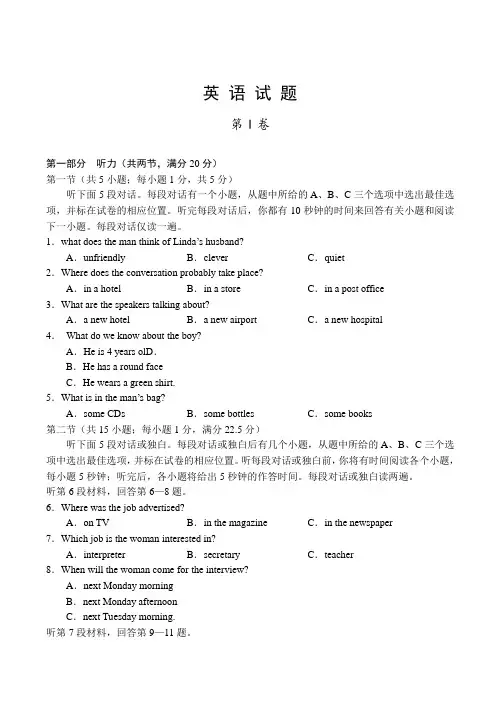
英语试题第I卷第一部分听力(共两节,满分20分)第一节(共5小题;每小题1分,共5分)听下面5段对话。
每段对话有一个小题,从题中所给的A、B、C三个选项中选出最佳选项,并标在试卷的相应位置。
听完每段对话后,你都有10秒钟的时间来回答有关小题和阅读下一小题。
每段对话仅读一遍。
1.what does the man think of Linda’s husband?A.unfriendly B.clever C.quiet2.Where does the conversation probably take place?A.in a hotel B.in a store C.in a post office3.What are the speakers talking about?A.a new hotel B.a new airport C.a new hospital4.What do we know about the boy?A.He is 4 years olD.B.He has a round faceC.He wears a green shirt.5.What is in the man’s bag?A.some CDs B.some bottles C.some books第二节(共15小题;每小题1分,满分22.5分)听下面5段对话或独白。
每段对话或独白后有几个小题,从题中所给的A、B、C三个选项中选出最佳选项,并标在试卷的相应位置。
听每段对话或独白前,你将有时间阅读各个小题,每小题5秒钟;听完后,各小题将给出5秒钟的作答时间。
每段对话或独白读两遍。
听第6段材料,回答第6—8题。
6.Where was the job advertised?A.on TV B.in the magazine C.in the newspaper7.Which job is the woman interested in?A.interpreter B.secretary C.teacher8.When will the woman come for the interview?A.next Monday morningB.next Monday afternoonC.next Tuesday morning.听第7段材料,回答第9—11题。
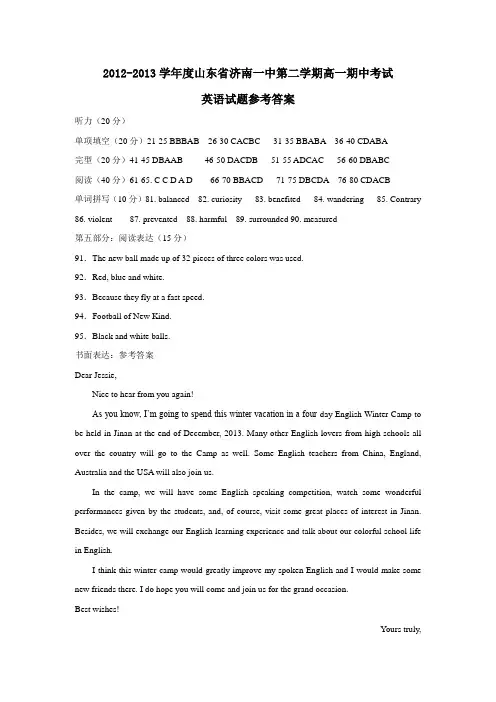
2012-2013学年度山东省济南一中第二学期高一期中考试英语试题参考答案听力(20分)单项填空(20分)21-25 BBBAB 26-30 CACBC 31-35 BBABA 36-40 CDABA完型(20分)41-45 DBAAB 46-50 DACDB 51-55 ADCAC 56-60 DBABC阅读(40分)61-65. C C D A D 66-70 BBACD 71-75 DBCDA 76-80 CDACB单词拼写(10分)81. balanced 82. curiosity 83. benefited 84. wandering 85. Contrary 86. violent 87. prevented 88. harmful 89. surrounded 90. measured第五部分:阅读表达(15分)91.The new ball made up of 32 pieces of three colors was used.92.Red, blue and white.93.Because they fly at a fast speed.94.Football of New Kind.95.Black and white balls.书面表达:参考答案Dear Jessie,Nice to hear from you again!As you know, I’m going to spend this winter vacation in a four-day English Winter Camp to be held in Jinan at the end of December, 2013. Many other English lovers from high schools all over the country will go to the Camp as well. Some English teachers from China, England, Australia and the USA will also join us.In the camp, we will have some English speaking competition, watch some wonderful performances given by the students, and, of course, visit some great places of interest in Jinan. Besides, we will exchange our English learning experience and talk about our colorful school life in English.I think this winter camp would greatly improve my spoken English and I would make some new friends there. I do hope you will come and join us for the grand occasion.Best wishes!Yours truly,James。
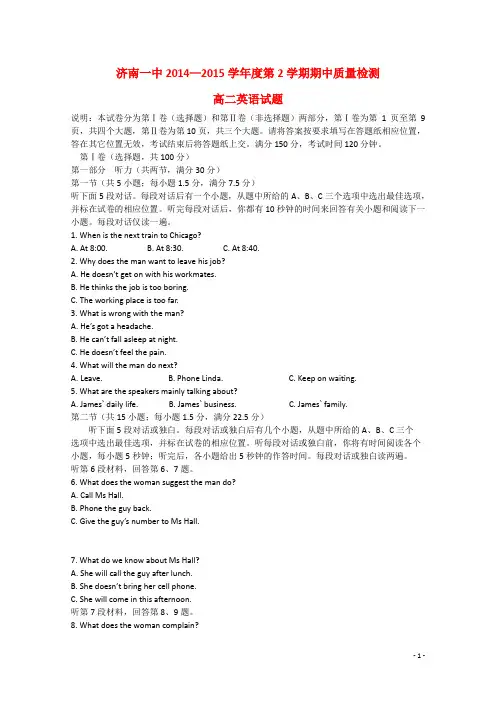
济南一中2014—2015学年度第2学期期中质量检测高二英语试题说明:本试卷分为第Ⅰ卷(选择题)和第Ⅱ卷(非选择题)两部分,第Ⅰ卷为第1页至第9页,共四个大题,第Ⅱ卷为第10页,共三个大题。
请将答案按要求填写在答题纸相应位置,答在其它位置无效,考试结束后将答题纸上交。
满分150分,考试时间120分钟。
第Ⅰ卷(选择题,共100分)第一部分听力(共两节,满分30分)第一节(共5小题;每小题1.5分,满分7.5分)听下面5段对话。
每段对话后有一个小题,从题中所给的A、B、C三个选项中选出最佳选项,并标在试卷的相应位置。
听完每段对话后,你都有10秒钟的时间来回答有关小题和阅读下一小题。
每段对话仅读一遍。
1. When is the next train to Chicago?A. At 8:00.B. At 8:30.C. At 8:40.2. Why does the man want to leave his job?A. He doesn’t get on with his workmates.B. He thinks the job is too boring.C. The working place is too far.3. What is wrong with the man?A. He’s got a headache.B. He can’t fall asleep at night.C. He doesn’t feel the pain.4. What will the man do next?A. Leave.B. Phone Linda.C. Keep on waiting.5. What are the speakers mainly talking about?A. James` daily life.B. James` business.C. James` family.第二节(共15小题;每小题1.5分,满分22.5分)听下面5段对话或独白。
济南一中2017~018学年高一下学期期中考试英语试题说明:本试卷分为第Ⅰ卷(选择题)和第Ⅱ卷(非选择题)两部分。
满分120分,考试时间120分钟。
考试结束后,将答题卡收回。
注意事项:1.答第I卷前,考生务必将自己的姓名、准考证号、考试科目涂写在答题卡上。
2.每小题选出答案后,用2B铅笔把答题卡上对应题目的答案标号涂黑,如需改动,用橡皮擦干净后,再选涂其它答案,不能答在试卷上。
第Ⅰ卷(选择题,共80分)第一部分听力(共两节,满分20分)第一节(共5小题;每小题1分,满分5分)听下面5段对话。
每段对话后有一个小题,从题中所给的A、B、C三个选项中选出最佳选项,并标在试卷的相应位置。
听完每段对话后,你都有10秒钟的时间来回答有关小题和阅读下一小题。
每段对话仅读一遍。
1. Why doesn`t the man want more ice cream?A. Because he is not hungry.B. Because he cares about his weight.C. Because he wants some meat.2. What is the woman`s favorite month?A. March.B. May.C. June.3. How long did the woman stay in Canada?A. 3 days.B. 5 days.C. 7 days.4. What should the two speakers do now?A. Cut the grass.B. See a film.C. Do some cleaning.5. What do we know about the man?A. He is quite confident.B. He does his work very slowly.C. He is rather tired.第二节(共15小题;每小题1分,满分15分)听下面5段对话或独白。
济南一中2017—2018学年度第二学期期中考试高一英语试题说明:本试卷分为第Ⅰ卷(选择题)和第Ⅱ卷(非选择题)两部分。
满分120分,考试时间120分钟。
考试结束后,将答题卡收回。
注意事项:1.答第I卷前,考生务必将自己的姓名、准考证号、考试科目涂写在答题卡上。
2.每小题选出答案后,用2B铅笔把答题卡上对应题目的答案标号涂黑,如需改动,用橡皮擦干净后,再选涂其它答案,不能答在试卷上。
第Ⅰ卷(选择题,共80分)第一部分听力(共两节,满分20分)第一节(共5小题;每小题1分,满分5分)听下面5段对话。
每段对话后有一个小题,从题中所给的A、B、C三个选项中选出最佳选项,并标在试卷的相应位置。
听完每段对话后,你都有10秒钟的时间来回答有关小题和阅读下一小题。
每段对话仅读一遍。
1. Why doesn`t the man want more ice cream?A. Because he is not hungry.B. Because he cares about his weight.C. Because he wants some meat.2. What is the woman`s favorite month?A. March.B. May.C. June.3. How long did the woman stay in Canada?A. 3 days.B. 5 days.C. 7 days.4. What should the two speakers do now?A. Cut the grass.B. See a film.C. Do some cleaning.5. What do we know about the man?A. He is quite confident.B. He does his work very slowly.C. He is rather tired.第二节(共15小题;每小题1分,满分15分)听下面5段对话或独白。
山东省济南市第一中学2013-2014学年高一下学期期中考试英语试题说明:本试卷分为第Ⅰ卷(选择题)和第Ⅱ卷(非选择题)两部分,第Ⅰ卷为第1页至第8页,共4题,第Ⅱ卷为第8页至第9页,共2题。
请将第Ⅱ卷答案答在答题纸相应位置上,考试结束后将答题卡和答题纸一并上交。
满分150分,考试时间120分钟。
第Ⅰ卷(选择题,共105分)第一部分听力(共两节,满分20分)该部分分为第一、第二两节。
注意:回答听力题时,请先将答案标在试卷上。
听力部分结束前,你将有两分钟的时间将试卷上的答案转涂到答题卡上。
第一节:(共5小题,每小题1分,满分5分)听下面5段对话,每段对话后有一个小题,从题中所给A、B、C三个选项中选出最佳选项,并标在试卷的相应位置上。
听完每段对话后,你有10秒钟的时间回答有关小题和阅读下一小题,每段对话仅读一遍。
1.What is the woman going to do?A. Watch a movie.B. See a doctor.C. Prepare a meal.2.Where did the man buy the MP3?A. From the Internet.B. From a supermarket.C. In a shop.3. How does the woman feel?A. Worried.B. Surprised.C. Angry.4. Where are the speakers going?A. A shop.B. The railway station.C. A restaurant.5. What is the probable relationship between the two speakers?A. Uncle and niece.B. Aunt and nephew.C. Cousins第二节(共15小题;每小题1 分,满分15 分)听下面5 段对话或独白。
济南一中高一第二学期期中考试英语试题本试卷分第I卷(选择题)和第II卷(非选择题)两部分,共9页。
满分150分。
考试用时120分钟。
第Ⅰ卷 (共110分)第一部分:听力(共两节,满分30分)第一节(共5小题; 每小题1.5分,满分7.5分)听下面5段对话。
每段对话后有一个小题,从题中所给的A、B、C三个选项中选出最佳选项,并标在试卷的相应位置。
听完每段对话后,你都有10秒钟的时间来回答有关小题和阅读下一小题。
每段对话仅读一遍。
第二部分:阅读理解(共两节,满分40分)第一节(共15小题;每小题2分,满分30分)阅读下列短文,从每题所给的四个选项(A、B、C和D)中, 选出最佳选项。
并在答题卡上将该选项涂黑。
AAre you interested in hi-tech products? Here are some that you might find at the market pretty soon.CX-1Tired of dragging your bag through busy airports? Then you might want to consider CX-1. The smart suitcase uses facial recognizing software to follow its owner as he / she is checking in or heading to the gate. Though CX-1 can only move at a speed of up to seven miles per hour, a tiny tool enables owners to keep track of the suitcase’s location. It is expected to be sold on the market by late 2018.AiboSony’s latest version of the Aibo robotic dog is almost as fun as the real thing—but much less work. The pet dog can recognize its owner, obey several commands, and even recall the behavior that pleases its master the most. Aibo can also learn new tricks, take photographs, and over time, develop its own unique personality.ForpheusForpheus, an “athletic”robot developed by Japanese technology company Omron. It teaches users how to play ping-pong. The 10-feet-tall machine uses a camera and artificial intelligence to track the ball’s speed and can predict the ball’s direction correctly. The smart Forpheus can alsoquickly test its player’s abilities and adjust the playing level, making the game fun.Black Box VRThough many people determine to go to the gym once a week, few reach their goal. Black Box VR wants to change that by turning hard exercise into fun video games. Using it, gym users will find themselves fighting enemies, including big creatures—all while getting exercise.21. What is the feature of CX-1?A. It can be opened by facial expressions.B. It can recognize and follow its owner.C. It can move very fast in busy places.D. It can sense the suitcase’s location.22. Who would most probably want an Aibo?A. People who want to walk a dog.B. People who often play tricks on others.C. People who want to take high-quality photographs.D. People who want a dog but can’t look after a real one.23. Which product can help people do physical exercise regularly?A. CX-1.B. Aibo.C. Forpheus.D. Black Box VR.BAre you carrying too much on your back at school? I’m sure lots of children of your age will say “Yes”. Not only do the students in China have this problem, but children in the United States also have heavy school bags.Doctors are starting to worry that younger and younger students are having back and neck problems as a result of school bags being too heavy for them.“It’s hard for me to go upstairs with my bag because it’s s o heavy,” said Rick Hammond, an 11-year-old student in the US.Rick is among students who have common school bags with two straps (带子) to carry them, but many other students choose rolling bags.But even with rolling bags, getting upstairs and buses is still a problem for children. Many of them have hurt their backs or necks because of the heavy school bags.But how much is too much? Doctors say students should carry no more than 10% to 15% of their own body weight.Scott Bautch, a doctor, said children under Grade 4 should stay with 10%. But it is also important that older children don’t stay with over 15%, because their bodies are still growing. “Children arelosing their balance and falling down with their school bags,” he said.Parents and teachers are starting to tell children to only take home library books they will be reading that night. Some teachers are using pieces of paper or thin workbooks for students to take home.One of the best answers is, as some children said, to have no homework at all!24. From the passage we can know that .A. only children in China carry too heavy school bagsB. both children in China and the US carry too heavy school bagsC. children in other countries don’t carry too heavy bagsD. only children in the US carry too heavy school bags25. If a child carries a heavy school bag, .A. his back or neck will be hurtB. his head and arms will be hurtC. his hands will be hurtD. his feet will be hurt26. According to Scott Bautch, if a child in Grade 5 weighs about 30 kilos, the school bag he carriesshould not be over ________.A. 5 kilosB. 3 kilosC. 5.5 kilosD. 4.5 kilos27. Some students think the best answer to this problem is that .A. they should have a little homework to do after they get homeB. their teachers had better not ask them to do any homeworkC. they should only take home library books they will read that nightD. they should use thin workbooks instead of thick onesCTh e popularity of bicycling continues to rise, and it is no surprise. It’s fun, healthy and eco-friendly. Maybe that’s why there are 1.4 billion bicycles and only 400 million cars on roads worldwide today. Bikes can take you almost anywhere, and there is no fuel cost!Hop on a bicycle and ride around your neighborhood. You may discover something new in your community. Stopping and getting off a bike is easier than stopping and getting out of your car. In many communities, you can bike to work and benefit from exercise without polluting the environment. You don’t even have to ride all the way. Folding bikes work well for workers who ride the train. Just fold the bike and take it with you.Have you ever thought about bicycling across a foreign country? It’s a g reat way to experience another culture, see beautiful scenery and meet friendly people. Bicycle enthusiast Goran Kropp bicycled across not just one country but several. He rode a remarkable 11,000 km from his home in Sweden to Nepal and then climbed Mount Everest! And now, bicycling across a country to raise money for a charity or to advertise a cause is also popular.To encourage people to bike, many cities in Europe have established bike-share programs. In Paris, for example, thousands of bikes are parked at bike stations around the city. Users can rent bikes at any station. The first half-hour of use is free. After that, users pay a small fee. When they’ve finished riding, they simply park their bikes at any station. For people who don’t want to drive, th e bikes are an excellent alternative(替代品)to buses and taxis, which burn fuel and cause pollution.As a result of the success of bike plans in Europe, they’re spreading to the US., Australia, China and other countries as well. Have you ever tried any shared bikes in your city?28. We can learn from the passage that _____.A. bikes are becoming more and more popularB. bikes save people’s timeC. bikes have increased in priceD. buses and taxis will be replaced by bikes29. According to this passage, workers in some cities can take their bikes _____.A. to concerts and festivalsB. into their company officesC. onto public transportationD. to large recreational areas30. We know from Paragraph 3 that _____.A. many people can use the same bikesB. the bikes aren’t likely to break downC. riders can keep the bikes for monthsD. people can ride bikes to raise money31. When do the bike riders in Paris have to pay a fee?A. When they damage the bikes in an accident.B. If they ride the bikes for over thirty minutes.C. After they receive a bill in the mail for a ride.D. Before they rent the new bikes at any station.DParties and social gatherings no longer excite us the same way they once did. This is not due to alack of desire to socialize, but the smartphone.At parties, more people are on their smartphones than on their drinks. According to a recent International Data Corporation study, well over half of all Americans have a smartphone and reach for it the moment they wake up, keeping it in hand all day. In addition, too much of society is using smartphones while driving and as a result getting into car crashes. 34 percent of teens admit to text while driving, and they confirm that text messaging is their number-one driving interruption. People’s attachment to their smartphones is unbelievably becoming more important than the lives of themselves and others.Just as drivers dismiss the importance of focusing while on the road, many people also fail to recognize the significance of human interaction. When with their friends, some people pointlessly check or send text messages in the presence of a friend, which sends a message to that friend: the person I am texting is more important than you. In addition, relying on our smartphone to make friends does not give us the same advantage as being able to make new friendships in the real world. Face-to-face conversations will give us much stronger communication skills in the long run.As many people risk their lives and the lives of people around them just to send a text or mindlessly check their messages, smartphones are in many ways more dangerous to people. The quality of this technology is de-advancing societal achievements and weakening the value of communication. Not only is the smartphone affecting our desire to interact(交流)face-to-face, but it is also lowering society’s ability to communicate.32. The purpose of this text is to _____.A. call for an end to use the smartphone while drivingB. appeal to us to pay attention to communication skillsC. advise us not to use smartphones to send messagesD. express concern about the overuse of the smartphone33. The author advises us to make new friends _____.A. by using smartphonesB. in a face-to-face wayC. in different waysD. under a free circumstance34. Over dependence on the smartphone leads to the fact that _____.A. parties and gatherings limit their social circleB. people are more and more narrow-mindedC. people’s communication skills are weakenedD. face-to-face communication becomes less important35. The underlined word “de-advancing” in the last paragraph can be replaced by _______.A. weakeningB. broadeningC. strengtheningD. promoting第二节(共5小题;每小题2分,满分1 0分)根据短文内容,从短文后的选项中选出能填入空白处的最佳选项。
2015-2016学年度第二学期期末模块考试高一英语试题本试卷分第I卷(选择题)和第II卷(非选择题)两部分,共10页。
满分120分。
考试用时120分钟。
注意事项:1. 答第I卷前考生务必将自己的姓名、准考证号填写在答题卡上。
2.选出每小题答案后,用2B铅笔把答题卡上对应题目的答案标号涂黑.如需改动, 用橡皮擦干净后,再选涂其他答案标号框.不能答在本试卷上,否则无效。
第Ⅰ卷(共85分)第一部分:听力(共两节,满分30分)第一节(共5小题;每小题1。
5分,满分7.5分)听下面5段对话.每段对话后有一个小题,从题中所给的A、B、C 三个选项中选出最佳选项,并标在试卷的相应位置。
听完每段对话后,你有10秒钟的时间来回答有关小题和阅读下一小题。
每段对话仅读一遍。
1。
What does the boy want to have?A。
Melons. B。
Apples. C. Honey。
2. Where are the speakers?A. In a shop。
B。
In a restaurant。
C。
In a hotel.3。
What does the man remember?A. The leaving time.B。
The flight number。
C. The meeting time.4. Why is the man going to Boston?A。
To visit a friend.B. To see the sights。
C. To go to some meetings.5. What do we know about the woman?A。
She is watching TV.B。
She will stay at home。
C。
She will go to the cinema later。
第二节(共15小题;每小题1.5分,满分22.5分)听下面5段对话或独白。
每段对话或独白后有几个小题,从题中所给的A、B、C三个选项中选出最佳选项,并标在试卷的相应位置。
济南一中2014—2015学年度第2学期期中质量检测高一英语试题说明:本试卷分为第Ⅰ卷(选择题)和第Ⅱ卷(非选择题)两部分,第Ⅰ卷为第1页至第7页,共60小题,第Ⅱ卷为第8页。
请将答案按要求填写在答题纸相应位置,答在其它位置无效,考试结束后将答题纸上交。
满分150分,考试时间120分钟。
第Ⅰ卷(共100分)第一部分听力(共两节,满分30分)第一节(共5个小题:每小题1. 5分,满分7. 5分)听下面5段对话。
每段对话后有一道小题,从每题所给的A、B、C三个选项中选出最佳选项,并标在试卷的相应位置。
听完每段对话后,你都有10秒钟的时间来回答有关小题和阅读下一小题。
每段对话仅读一遍。
What does the man want to do?Go to college.Buy a present.Talk to his daughter.What does the woman mean?The man tells good jokes.Her train leaves early tonight.She won’t go to the movie with the man.What’s the man’s problem?He didn’t take a phone with him.He can’t find the woman’s number.He was too busy to call the woman.How many people will the table be for?A. Four.B. Six.C. Ten.What do the speakers plan to do?Travel in spring.Sell their apartment.Move to a new house.第二节(共15小题:每小题1. 5分,满分22. 5分)听下面5段对话或对白,每段对话或对白后有几个小题,从题中所给的A、B、C三个选项中选出最佳选项,并标在试卷的相应位置,听每段对话或独白前,你将有时间阅读各个小题。
济南一中2015—2016学年度第2学期期中考试高一英语试题本试卷分第I和第II两卷,共10页,考试时间120分钟,满分150分。
第 I 卷 (选择题,共100分)第一部分:听力(共两节,满分30分)做题时,先将答案划在试卷上。
录音内容结束后,你将有两分钟的时间将试卷上的答案转涂到答题卡上。
第一节(共5小题;每小题1.5分,满分7.5分)听下面5段对话。
每段对话后有一个小题,从题中所给的A、B、C三个选项中选出最佳选项,并标在试卷的相应位置。
听完每段对话后,你都有10秒钟的时间来回答有关小题和阅读下一小题。
每段对话仅读一遍。
1. What does the boy hope to do next summer?A. Study a course.B. Earn some money.C. Visit China.2. How does the man feel about the film?A. It’s boring.B. It’s exciting.C. It’s interesting.3. How long will the trip last?A. 30 minutes.B. 3 hours.C. 90 minutes.4. What will the woman probably do next?A. Get some tea.B. Go to bed.C. Eat something.5. What is the man doing?A. Admiring the woman.B. Congratulating the woman.C. Showing his thanks to the woman.第二节(共15小题;每小题1.5分,满分22.5分)听下面5段对话或独白。
每段对话或独白后有几个小题,从题中所给的A、B、C三个选项中选出最佳选项,并标在试卷的相应位置。
听每段对话或独白前,你将有时间阅读各个小题,每小题5秒钟;听完后,各小题将给出5秒钟的作答时间。
每段对话或独白读两遍。
听第6段材料,回答第6、7题。
6. What happened to the old man?A. He fell off a truck.B. He was ill.C. He was hit by a car.7. What is the weather like?A. It is cloudy.B. It is raining.C. It is sunny.听第7段材料,回答第8、9题。
8. What is wrong with the man?A. His nose got hurt.B. He was bored.C. He is having headaches.9. When did the man’s p roblem begin?A. About 2 months ago.B. About 3 months ago.C. About 2 weeks ago.听第8段材料,回答第10至12题。
10. What is the relationship between the speakers?A. Viewer and ticket clerk.B. Guest and hotel clerk.C. Customer and bank clerk.11. How much will the man pay in total?A. $2.5.B. $4.C. $10.12. When will the performance end?A. At 6:00 p.m.B. At 8:30 p.m.C. At 10:30 p.m.听第9段材料,回答第13至16题。
13. Where does the conversation probably take place?A. At a hotel.B. At a light shop.C. At the woman’s home.14. What does the woman want the man to do?A. Move her things.B. Buy her some medicine.C. Get her a brighter light.15. How does the woman feel?A. Thirsty.B. Cold.C. Sleepy.16. What will the man do next?A. Turn off the air conditioning.B. Fetch some hot water.C. Buy a new blanket.听第10段材料,回答第17至20题。
17. How does the man feel?A. Tired.B. Anxious.C. Delighted.18. What can we learn about the woman?A. She got a new house.B. She bought a new car.C. She lives near her workplace.19. What does the woman advise the man to do?A. To move into her apartment.B. To talk with his landlord.C. To change his job.20. How far is it from the woman’s apartment to the man’s office?A. 15 minutes’ car ride.B. 15 minutes’ bike ride.C. 15 minutes’ walk.第二部分:阅读理解 (共两节,满分40分)第一节(共15小题;每小题2分,满分30分)阅读下列短文,从每题所给的四个选项(A、B、C和D)中,选出最佳选项并在题卡上将该项涂黑。
AQuiet classes, endless exams and long hours at school …This might sound like the daily life of many Chinese highschool students. But a group of 50 Grade 9 students fromBohunt School in Hampshire, UK, decided to try out Chineseschools for over a four-week period.Five Chinese teachers were sent to a UK school to teach the British students in a Chinese style. The Chinese teache rs came in with high expectations, but they quickly found discipline (纪律) was their biggest challenge. “When I walked into the classroom, some students were chatting, some students were eating, and somebody was even putting make-up on her face.I had to control myself, or I would have gone crazy,” said one of t he teachers Li Aiyun.The British students had complaints too. Many of them found the classes boring. “It’s all about repetition(重复) and copying notes from the board,” one student said.The students finally took a test, and the Chinese class scored better than other classes. Chinese teachers were happy, but they owed (把……归功于) it to the students for working hard. They also realized their teaching style was “a bit too rigid (死板的)”. “It’s very hard to say which education system is better. But I think we can learn fro m each other,” said Li Aiyun.Education should be well-rounded and it is mainly for improving a person. It is not only to teach him/her to speak, read and write, but also to develop his/her creative thinking and other abilities. Though the education systems are so different between Britain and China, we agree that getting education is the most important part in a person’s life.21. 50 Grade 9 British students decided to try out Chinese schools for about____ .A. half a monthB. a monthC. four monthsD. half a year22. Li Aiyun could hardly control herself in class of UK because some Britishstudents _____.A. did what they wanted to do in classB. were so interested in her classesC. got bad grades and failed the examsD. didn’t copy notes from the board23. The underlined word “well-rounded” in the passage means ______ inChinese.A. 有利的B. 公平的C. 全面的D. 必要的BStarting from my second year of primary school, there was one event I hated every year: the piano concert. I didn’t want to practice a boring piece of music and was scared to perform in front of strangers. Each year I would ask my father if I could miss the concert “just thisonce”. And he would say something about buildingself-confidence and working towards a goal.So I was very proud when I stood in church(教堂) andwatched my father play the piano during his very fir st concert.My father wanted to play music when he was small. But his mother couldn’t afford lessons.Three years ago, when he retired(退休), he asked the church music director, Charles, to take him as a student. Just before the concert, Charles told me m y dad was playing “the best I’ve ever seen him.” For a moment after my father sat down at the keyboard, he simply stared down at his fingers.I wondered whether he would even begin.But then Aram Khachaturian’s Melody(交响乐) began. It seemed that my father took the music so seriously that he didn’t realize we were there. My dad made it through Melody and then through another song. Although he didn’t have much skill, he made up for it in feeling.My 11-year-old son Jeff was there. “So what did you think about your grandfather?” I asked Jeff later. “He was great,” Jeff replied.My father may not have reached his top musically, but in his grandson’s eyes, he’s at the top of the mountain.24. From the first paragraph, we know the writer_______.A. was always working towards his goalB. didn’t like to play the piano at allC. was confident at piano concertsD. practiced the piano every day25. While watching his father pl ay the piano, the writer felt _____.A. worriedB. sadC. happyD. proud26. Why did people like the performance of the writer’s father?A. Because he played with his feelings.B. Because he communicated with people.C. Because he was an old learner.D. Because he practiced hard.27. What does the story tell us?A. Learning an instrument is easy for old people.B. Skills for playing an instrument aren’t very important.C. Never give up your dreams no matter how old you are.D. Children should follow parents’ decisions.CBy May, after three months, I had lost 22 pounds and reached my goal of 115 pounds. My friends would say “Alice, you look great!” or “ How did you lose so much weight? ”. Those compliments(赞扬)made me feel good and confident.Soon I dropped to 110 ponds. A few of my friends told me that I need to stop dieting because I was starting to look sick. They brought me a present—a bag of chocolates, which I later gave to my sister. My mum would come to my room, with tears in her eyes, and have long chats about how harmful this diet was and begged me to stop. My dad would leav e worried messages on my cell phone at school, telling me that it would do serious harm to my body.By mid-June, when school was coming to an end, I was down to an only alive state of 95 pounds. All of a sudden, I knew I had to do something.I guessed the number itself scared me. I recalled my doctor. He told me abouta girl who was 95 pounds and was at the risk of dying. I knew I was putting my life at risk, but for what? To make those who love me worried? Is it worthwhile to be thin?Now I realize that models in magazines, TV and movies are not realistic. The price to pay for the “perfect body” is living with the dangerous and sometimes deadly eating disorder. And there are more important things to think about than how thin you are.28. How did the author feel when she weighed 115 pounds?A. Happy.B. Disappointed.C. Worried.D. Painful.29. The author’s mother went to her room to ________.A. bring her some chocolates.B. tell her she missed her.C. ask her to stop dieting.D. talk about her studies.30. The author decided to stop dieting____.A. when her friends told her to do soB. when her weight dropped to 95 poundsC. when her father left some messagesD. when her mother had a talk with her31. What does the writer want to tell us?A. It is too expensive for people to lose weight.B. You will be healthy as long as you stop dieting.C. There is no model with a perfect body in real life.D. Being thin is not the most important thing in our life.DThe first full choir rehearsal(唱诗班排练)of the school year took place in the school hall. All the students joined together to sing. I watched as my elder sister and her grade came in and took their places next to us on the stage. Meanwhile, I could hear laughing. Some students were pointing at a girl standing next to my sister. I’d never seen this girl before. A girl whispered in my ear, “Did you know she’s wearing diapers(纸尿裤)?”After school that evening, I asked my sister about the girl I’d seen. She told me her name was Theresa and that she was a very nice girl. “Why were those kids being mean(刻薄) to her?” I asked. “Because they’re stupid,” she said.One day, I was walking home from school when I heard voices and laughter behind me. “There’s the little fool’s sister. Does your sister wet her pants too?” I walked a little faster and then I felt a stone hit me in the back. When I got home, I ran down to my sister’s room.I pushed my way into her room, screaming at her. “Why do you have to be that girl’s friend? I don’t see anyone else being nice to her.”Janelle yelled back, “Because she’s a wonderful person and she’s dying!”I will remember those words as long as I live. Theresa wet her pants because she had an illness, which was killing her. My sister was the only one nice enough to be her friend. A few months later, Theresa passed away.I felt proud that Janelle was my sister. Throughout the years I watched her, and she always made friends with everyone. It didn’t matter if they were fat, thin, c lever or not. She never left anyone feeling isolated(被孤立) or alone. It was she who changed me and taught me never to look at anyone in the same way again.32. Why did other students make fun of Theresa?A. Because she was dying very soon.B. Because she was not good at singing.C. Because she behaved in an unusual way.D. Because she was usually dressed poorly.33. What was the turning point of the story?A. Janelle became a friend of Theresa.B. Theresa suffered from a serious illness.C. The author lost her temper to her classmates.D. The author was told the truth about Theresa.34. What is the message conveyed in the story?A. We shouldn’t look at anyone shallowly(肤浅的).B. Making friends teaches us more things.C. Disadvantaged people need our sympathy.D. Understanding is important among friends.35. What might be the best title for the passage?A. A Girl in Need of HelpB. A Great Hero to MeC. An Unforgettable RehearsalD. An Embarrassing Experience第二节(共5小题;每小题2分,满分1 0分)根据短文内容,从短文后的选项中选出能填入空白处的最佳选项。